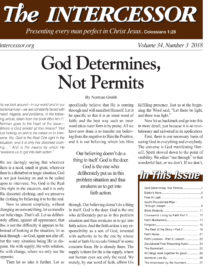
Bible Bedrock
“Ye thought evil against me, but God meant it unto good.” –Genesis 50:20
The first principle of faith in action…is that inner seeing must come before proper believing. Now in this world full of evil and problems, we will always, as humans, start by “seeing things as they are”—as they appear to be—and that means seeing and believing in something that disturbs us, which we call evil, and so it may be. This is “negative” believing…and what we are inwardly seeing, and therefore believing, is what we outwardly transmit to others. We can’t help it in our looks, words and deeds, for all we share with others is ourselves; and if we see things as evil we transmit negative believing to others—we transmit darkness, not light; death, not life.
Is there an alternative? Yes, there is—and that was what settled into me, once I saw God as all: that there cannot be two powers, for He is one, absolute and supreme. But how, then can I include the workings of an evil power, of which the world and people are so full, as an expression of the one power which is God, who it love?
For that I had to find my solution, and of course I turned to the Bible. There I found the plainest of statements, which did link God with evil. The prophet Isaiah said plainly (45:6-7), “I am the Lord, and there is none else. I form the light, and create darkness; I make peace, and create evil [Hebrews ra—adversity, calamity]; I, the Lord do all these things.” That statement is total enough. But there are plenty more. To Moses, God said (Ex. 4:11), “Who hath made…the dumb, or deaf, or the seeing, or the blind? Have not I, the Lord?” When Jeremiah spoke of God’s coming judgment on rebellious Israel with the destruction of Jerusalem and the temple, he said that God had called the heathen king who would destroy them “Nebuchadnezzar, My servant” (Jeremiah 43:10)? The Assyrians God called “the rod of My anger” (Isaiah 10:5). All the destructive plagues of insects that destroyed harvest after harvest in the days of Joel the prophet, “the palmerworm, the locust, the cankerworm, the caterpillar,” God spoke of as “My great army which I sent among you” (See Joel 1:4 and 2:25). There are dozens of such sayings by the prophets.
We all know about Joseph, and he went even further. He left no room for us to say that God “permits” evil things to happen but does not direct them; for, even though he had suffered thirteen years by being sold as a slave by his brethren and then being thrown into prison because of the false accusation of Potiphar’s wife, still he told his brethren, “Ye thought evil against me, but God meant it unto good” (Genesis 50:20) Meant it! To “mean” is not to “permit.” It is direct purpose and planning.
Peter, in a startling statement in his speech on the day of Pentecost, when referring to the greatest crime in history, told the crowds, “Jesus of Nazareth…Him, being delivered by the determinate counsel and foreknowledge of God, ye have taken, and by wicked hands have crucified and slain” (Acts 2:22-23). Determinate counsel—no “permissiveness” there!
—Yes, I Am
by Norman Grubb





